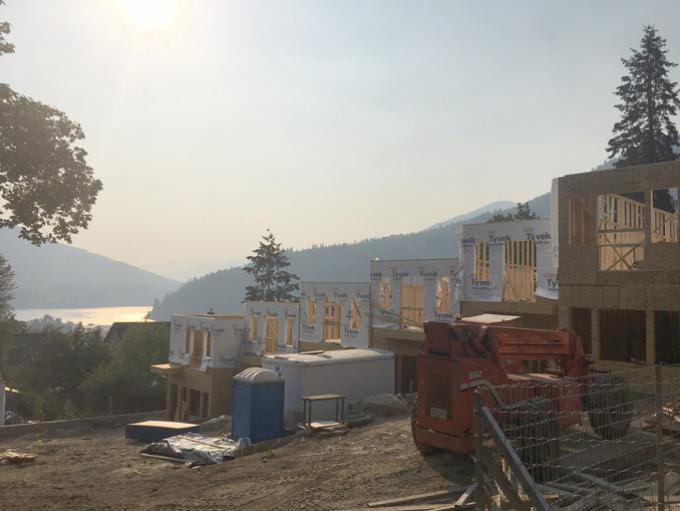Building boom drives the bottom line for the city
The building boom continues to drive the city’s fortune and finances in 2018, and it is expected to continue into next year, the city’s chief financial officer says.
Colin McClure said in his third quarter financial report recently it doesn’t look like the building boom the city is currently in the midst of will be abating for 2019.
“It’s a positive because we have growth going on in our community and that’s a good thing to see, but on the other side it impacts staffing,” he said.
Development Services at City Hall has been severely impacted and is hard pressed to keep up, McClure said.
“But how does one staff for a department that has ebbs and flows that can be so serious from time to time?” he asked. “We are trying to work through that back log.”
Other revenue is higher this year than in the prior year mainly due to the significant increase in building and development permit fees.
The city is $100,000 more than budgeted for in building and development permits than what was budgeted at the outset of the year, and finds itself $125,000 ahead of what was received by this time last year.
There is a lot in the pipeline for major development for Nelson, with four major projects slated to start in spring of 2019, dropping around 250 units of housing into the Nelson market when they are completed.
Overall the city is on target to end the year in line with the budgeted operating revenues, said McClure.
Making money
The city is currently on target to meet the budget for investment income, said McClure.
The city, through the Municipal Finance Authority, has been able to invest funds in a high interest savings account where the rate changes in-line with the changes in the prime lending rate, which will increase the city’s investment income and offset the short-term pressure on the bond investments.
“However, there is a high likelihood that the Bank of Canada will raise the prime lending rate … and it is unknown if there will be more increases this year,” McClure said.
“These increases put pressure on the bond fund returns in the short term and may negatively affect the city’s year-end investment results.”
The wheels on the bus
The other major point in the third quarter has been the success of transit in Nelson.
Transit revenues are higher than at the same time last year and higher than what was expected and budgeted this year, said McClure, up 10 per cent to $216,551.
The walls are being broken down between the communities and are trying to increase the value of the service for the dollars spent, he said.
“They made one fee … and I think that is great for the community, especially the lower income people and students as well,” McClure said. “We are seeing that in ridership as a result.”
The collaborative work of the West Kootenay Transit committee and the setting of one fair price to travel the entire length of the system had both a positive result on ridership and revenue, he added.
Of note, the revenue is 25 per cent higher from the sale of bus passes when compared to the prior year, while there has been a corresponding eight per cent drop in cash fares.
Powering up
The city’s utility has also had an increase in revenue in 2018.
Nelson Hydro is slightly ahead of the forecasted budget for revenue this year due to the cooler than average winter in 2018.
“When creating the budget for revenue Nelson Hydro uses a five-year average of temperatures to forecast what the expected revenue will be,” McClure explained.
He added that all other city revenues appear to be in line with budget expectations and are deemed consistent with prior years.
Riding into the red and black
The city spent the budget in the first three-and-ahalf months of 2018.
“And we still know that winter is coming and we won’t get away from that,” McClure said. “All things considered in that budget … but there is a good chance that we will have some problems in that area of the budget.”
Overall the city is managing the expense portion of the operating budget within the expected parameters.
“An increase in labour relations legal costs associated with the fire arbitration case, coupled with the increase in staffing and contractors in the planning department in order for them to keep up with the surge of demand for their services are factors as to why general government expenses are higher than in prior year,” said McClure in his report to council.
“In addition, there has been upward pressure on the renewal fee cost on many of the software programs utilized by the city.”
The main reason Protective services expenses are in line with budget and higher than the previous year is that the collective agreements for police and fire have been ratified so the wage expense now reflects those wages.
In 2017, the firefighters were paid at the wage rates from the 2011 expired collective agreement thus creating the difference when compared to 2018. Cold hard cash
As discussed in the second quarter financial update the city, McClure said the entire 2018 annual snow removal budget has been expended.
“Depending on how much snow removal is required in the fourth quarter will determine how over budget on this category the city will be by the end of the year,” he said.
The Public Works managers have been monitoring the Transportation budget and containing costs where they can, McClure explained.
“Currently, there appears to be a health balance remaining in this budget but this is related to the timing of planned work on pavement patching, sidewalk maintenance and leaf pick-up to be undertaken in the next couple of months in earnest,” he said.
It is likely that the snow removal service will be over budget this year, McClure predicted.
— Source: City of Nelson
Revenues are budgeted to occur evenly through the year, resulting in some favourable/unfavourable revenue variances due to timing differences. It is anticipated that these timing differences will be resolved prior to year-end, said McClure.

























